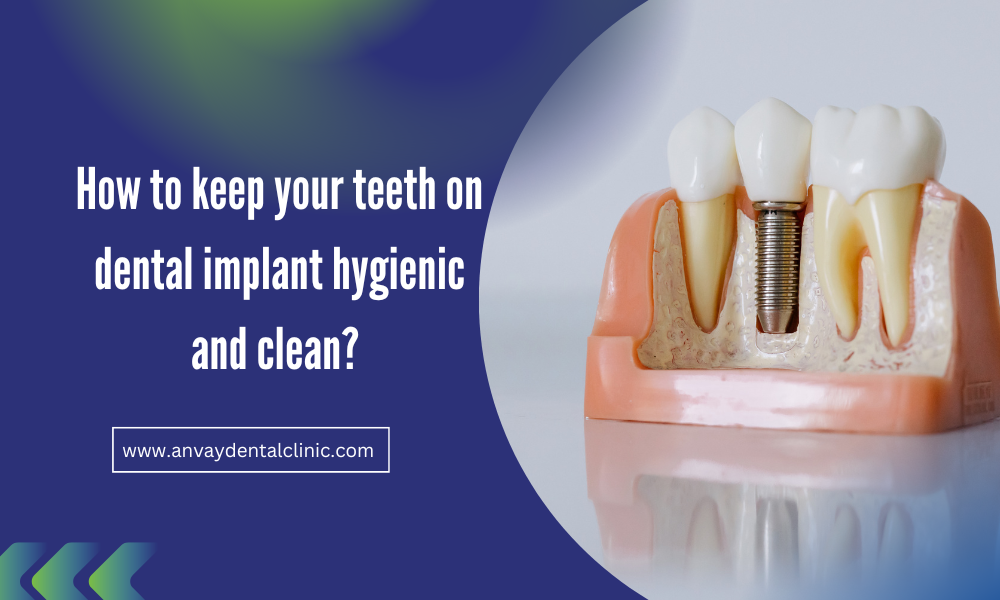Blog
How to keep your teeth on dental implant hygienic and clean?

You no longer have to settle for conventional dentures as your only option to replace your missing teeth because of contemporary advancements in dentistry. You can benefit from a more stable, natural-looking, and long-lasting replacement with dental implants. However, how the implant is taken care of will determine how long it lasts. To ensure that your smile is both functional and aesthetically beautiful for many years to come, keep reading to learn these useful recommendations!
Use a Soft Nylon Brush
It’s important that you’ll need to change toothbrushes after obtaining dental implants every 3 to 4 months. This is due to the bristles on nylon toothbrushes being flexible and mild on your dental implants. To clean the challenging-to-reach places surrounding your dental implants, you can also use a Proxabrush.
Be careful not to use toothbrushes with rough bristles because they could harm the surface of your implants. In fact, after your implants are in place, you should refrain from cleaning your mouth with any kind of metal device. Just continue to clean and floss your teeth as usual, twice a day.
Avoid Abrasive Products
Once you have dental implants, you should try to limit your purchases to delicate cleaning products, such as mouthwash and toothpaste. This is because too abrasive products may result in excruciating agony. In general, you should stay away from oral hygiene products with strong abrasive materials because they can roughen your implant as well as teeth surfaces and create a place where there can be more of microbial accumulation. This all in turn can lead to severe results after a certain time phrase.
Floss Daily
Dental implants make flossing as a crucial habit in long term success. This is because plaque, which can cause other dental hygiene problems, can quickly build up around your implants. You really have no excuse not to clean your teeth, now that there are so many different types of floss available that are specifically made for people with dental implants.
Dental implants make flossing as a crucial habit in long term success. This is because plaque, which can cause other dental hygiene problems, can quickly build up around your implants. You really have no excuse not to clean your teeth, now that there are so many different types of floss available that are specifically made for people with dental implants.
Water Flossers / Oral Irrigators
Patients are advised to utilise Water Flossers to remove dental plaque, inflammation, and challenging-to-reach areas surrounding implants.
The maintenance of dental implants requires the use of a Water Flossers. The creation of a water jet with adjustable pressure under which the teeth are cleaned, serves as the basis for the cleaning activity. The water jet also massages the gums, maintaining their health. Gum massage enhances blood circulation in the gums, strengthening soft tissue.
A Water Flossers does not increase the risk of mechanical harm when used to clean teeth. It is absolutely painless, safe, and highly efficient. The regular use of the Water Flossers has been shown in clinical studies to lower the incidence of tooth decay and periodontal disease.
After implantation, periodontal disease can develop and expose the implant’s neck, which might result in irritation and the prosthetic tooth’s rejection.
Give Up Smoking
Smokers with dental implants are more likely to have a number of health issues, which has been scientifically verified. Smoking tobacco might lead to issues at the implant site that can result in inflammation. It’s crucial to stop harmful behaviours because doing so will help you prevent problems.
Smoke from cigarette products also fosters the environment needed for tartar to form. Tartar builds up on the teeth and harms implants.
Eating Healthy
It is well known that consuming foods high in sugar and soda speeds up the deterioration of prosthetic teeth on dental implants. To fulfil your sweet tooth, switch from candy, sodas, and cakes to fruits and juices. This will not only assist you to keep your teeth but will also be very good for your body’s overall health.
Visiting the Dentist
Since the cavity may also develop on the back of your teeth or on teeth that are positioned at the far end of the jaw, such molars and premolars, there are times when it can only be viewed by a dentist. Regular dental checkups can ensure the health of your teeth and aid in the early discovery of cavities, should they have already started developing without your notice.
Dentists can also provide suggestions or substances to help you strengthen your teeth even more. In the event that you have been improperly brushing and flossing, they can also offer advice.
Brush Twice A Day
Just after waking up in the morning, brushing your teeth gets rid of the bacteria that has accumulated in your mouth over night and helps avoid the development of morning odour. Similarly, brushing right before bed reduces the chance of plaque buildup and tooth decay throughout the night by removing bacteria that have accumulated throughout the day.
Additionally, many dentists advise brushing right after eating or whenever you feel that food particles and germs have built up in your mouth and need to be completely cleansed, particularly if you have dental implants so that they won’t be harmed any longer.
Resort to bridge and crown floss
Dental implants can be cleaned both under and over with Crowns and Bridge floss. It includes a fluffy centre and two firm nylon ends that gently clean the porcelain that touches the teeth and the surface of the dental implant. The hard ends make it easier to push the floss through to the other side and between the dental implants in the gumline. In this manner, the fluoride is evenly distributed throughout the implants, preventing an excessive bacterial growth.

